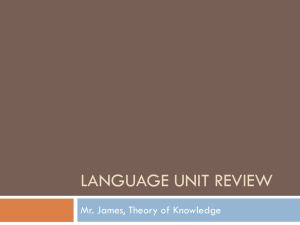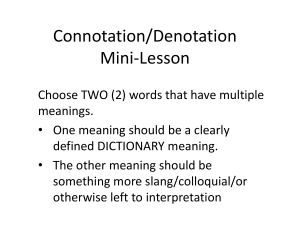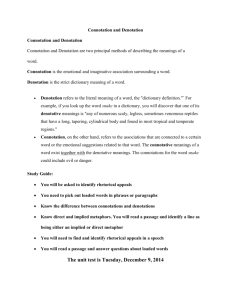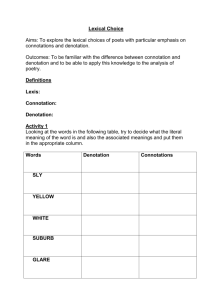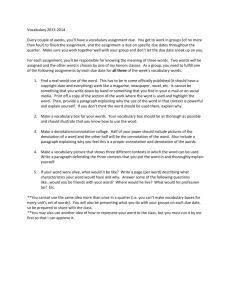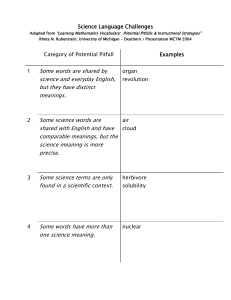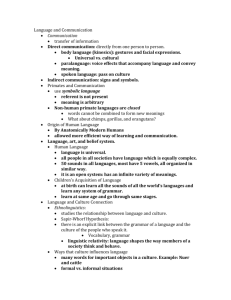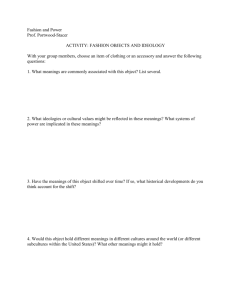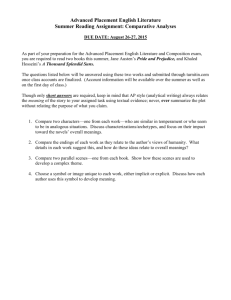What is language? “If your language is confused, your intellect, if not
advertisement
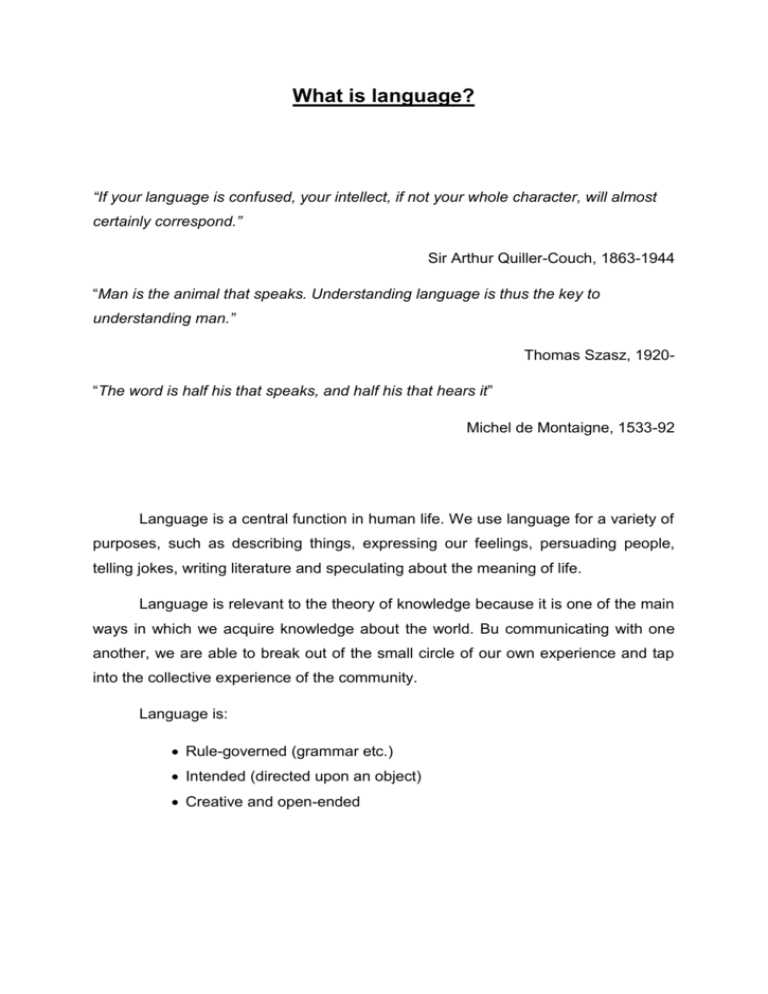
What is language? “If your language is confused, your intellect, if not your whole character, will almost certainly correspond.” Sir Arthur Quiller-Couch, 1863-1944 “Man is the animal that speaks. Understanding language is thus the key to understanding man.” Thomas Szasz, 1920“The word is half his that speaks, and half his that hears it” Michel de Montaigne, 1533-92 Language is a central function in human life. We use language for a variety of purposes, such as describing things, expressing our feelings, persuading people, telling jokes, writing literature and speculating about the meaning of life. Language is relevant to the theory of knowledge because it is one of the main ways in which we acquire knowledge about the world. Bu communicating with one another, we are able to break out of the small circle of our own experience and tap into the collective experience of the community. Language is: Rule-governed (grammar etc.) Intended (directed upon an object) Creative and open-ended Two different views about the relationship between language and knowledge On one side, some people claim that in order to know something you must be able to put it into words, and that ‘if you can’t say it then you don’t know it’(Hans Reichenbach,1891-1953). The only way to demonstrate your understanding of something is to put it into words. Against this, other people insist that some of our knowledge lies beyond words, and that ‘I know more then I can say’. Mystics in all the great world religions have held that the deepest truths cannot be expressed in language. The Taoist sage Lao Tzu (600 BCE) observes that ‘Those who speak do not know; those who know do not speak’. The Buddhist Lankaatara Sutra tells us that ‘Truth is beyond letters and words and books.’ One thing, however, is certain: if the deepest truth about life, the universe and everything do lie beyond words, then there is nothing we can say about them. Philosopher Ludwig Wittgenstein (1889-1951) is at the end of his great book Tractatus Logico-Philosophicus wrote: “What we cannot speak about we must pass over in silence.” The problem of meaning Meaning is important in our search for knowledge because you must know what a sentence means before you can decide whether it is true or false. Since much of our knowledge comes to us in the form of language, we need to be clear about the meanings of words if we are to understand the information that is being communicated to us. We will look at three theories of what distinguishes meaningful words from meaningless ones. The first theory says that meanings are to be found in dictionaries, the second that they are found in the world, and the third that they are found in the mind. 1. Definition theory says that the most obvious way of trying to resolve confusions about what a word means is to consult a dictionary. However, coming up with a good definition of a word is more difficult that it seems. For example, could you try to define word love or freedom? What does this suggest to you about the limitation of definitions? 2. Denotation theory says that word must to refer on something in the world. But if we took the denotation theory literally, then people would be unable to talk about us after we were dead. And what about abstract words like freedom and wisdom which do not seem to stand for any thing. 3. Image theory says that meaning of a word is the mental image it stands for, and you know the meaning of a word when you have the appropriate concept in your mind. But the problem whit image theory is that if meanings are in the mind then we can never be sure that someone else understands the meanings of a word in the same way that we do, or, indeed, that they understand it at all. For you can never get into another person’s mind and find out what is going on in it. Rather than think of meanings as something that can be found in dictionaries, or in the world, or in the mind, perhaps it would be better to say that meaning is a matter of know-how, and that you know the meaning of a word when you know how to use it correctly. Problematic meaning There are five kinds of problematic meaning that can be found in everyday language: Vagueness – many words are vague and their meaning depends of context. But, it is impossible to make words completely precise. For example, how little hair a man must have before you can describe him as bald? Same men are balder then others, but it is impossible to say exactly where non-baldness ends and baldness begins. Ambiguity - many words and phrases are ambiguous. A politician might exploit ambiguous sentences so it is understood in different ways by different listeners. For example, “I am opposed to taxes which damage incentives” could be taken to mean “I am opposed to all taxes because they damage incentives” or “I am opposed only to those taxes which damage incentives”. Context can help us to determine the meaning of an ambiguous sentence. Secondary meaning – words have not only primary meaning or denotation but also a secondary meaning or connotation. The denotation of word is what it refers to, and the connotation is the web of associations that surrounds it. While the denotation of word is public its connotations vary from person to person. Words such as love, death, school may have different connotations for different people. Metaphor – we use language not only literary but also metaphorically. When trying to decide whether a sentence is meant literary or metaphorically, we might get a hint from the context. For example, try to recognize which one of the following two sentences is used metaphorically: o 1) My brother is a butcher. o 2) My dentist is a butcher. Irony – is something that is found in all cultures and shows how problematic language in use can be. Irony is when you say one thing in order to mean the opposite. For example, you might look out of the window and if you see that it’s raining outside, you can say “Nice weather!” We could conclude that language is ambiguous, because vagueness, secondary meaning, metaphor and irony can be all seen as different kinds of ambiguity. The implication is that there is an element of interpretation build into all communication. For example, if someone says “I am so angry I could kill him!!!” you would probably not alert the police. Language and translation “Who does not know another language does not know his own” – Goethe, 17491832. There are three problems that arise in translating something form one language to another: 1) Context – the meaning of a word in a language is partly determined by it’s relation to other words; 2) Untranslatable words – every language contains words that have no equivalent in other languages; 3) Idioms – example: “He was born with the silver spoon in his mouth”, “I was over the moon!” Most linguists would say that there is no such thing as perfect translation, and that there is something always lost when we move from one language to another. Stereotypes We use language to label and classify and this brings with it the danger that we misclassify or stereotype things. One danger with putting labels on people is that our labels can easily harden into stereotypes. A stereotype arises when we make assumptions about a group of people purely on the bases of their membership of that group. Stereotype is usually based on prejudice rather than fact and is difficult to change in the light of contrary evidence. What stereotypes do you think exist in your culture concerning the following groups: 1) Islamic fundamentalists, 2) Computer hackers, 3) Americans, 4) Lawyers…? To what extent do you think they affect the way people see things. We use language not only to describe but also to influence and persuade and sometimes manipulate the way people see things. According to the Sapir-Whorf hypothesis language determines our experience of reality so we can see and think only what our language allows us to see and think. Since the Sapir-Whorf hypothesis claims that language determines the way we think it can be described as the form of linguistic determinism. For example in Orwell’s book 1984, totalitarian government called Ingsoc created a new language “New speak” with the purpose to control how people behave and what they think.
